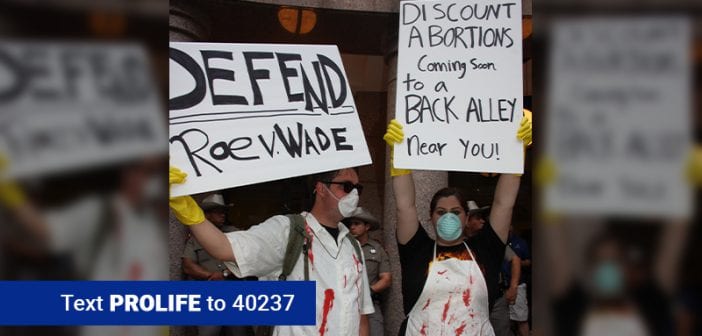And Texas Right to Life receives a shoutout.
Almost every major Pro-Life law faces a legal challenge from the abortion industry, desperate to perpetuate its practice of profiting off of the destruction of innocent human Life. Irrespective of legal merit and notwithstanding political fallout, Texas Pro-Life laws usually arrive in a courtroom where the State must defend them. Predictable, therefore, is the legal challenge to the Texas Heartbeat Act filed by the abortion industry earlier today. However, unlike with other Pro-Life laws, the Legislature intentionally drafted Senate Bill 8, the Texas Heartbeat Act, to swiftly dispense with any half-baked lawsuit seeking preliminary injunctive relief.
The Texas Legislature could use three different mechanisms to enforce Pro-Life laws. The first is enforcement by criminal penalties which subject someone to criminal prosecution for violating the law. An example is the Dismemberment Abortion Ban, the violation of which constitutes a state jail felony for the abortionist. The second is enforcement by administrative action, by which some governing body of the state may professionally sanction someone. For instance, the Texas Medical Board may suspend or revoke the medical license of an abortionist who violates the Preborn Pain Act. The last, and most effective means, is civil enforcement. This is when other individuals are authorized to sue someone who violates the law. The Texas Heartbeat Act utilizes only civil enforcement, affording most people the capacity to sue abortionists as well as anyone else (except for the mother) who aids or abets an abortion after a preborn child’s heartbeat is detected. Government officials do not enforce Senate Bill 8.
What makes this distinction significant legally is that none of the defendants the abortion industry typically sues—the attorney general, district attorneys, the Texas Medical Board, the Health and Human Services Commission, etc.—are charged with enforcing the Texas Heartbeat Act. They may enforce other Pro-Life statutes as the law prescribes, but they have precisely nothing to do with Senate Bill 8.
This attribute of the Texas Heartbeat Act is not some legal accident. Here, Texas Right to Life received a citation in the legal complaint filed against Senate Bill 8:
As the legislative director for Texas Right to Life (the largest anti-abortion organization in the state) explained during the legislative proceedings, every six-week ban on abortion adopted by other states “has been enjoined or had at least some negative court action,” and “it’s because of the [government]enforcement mechanism” provided for in those laws. He later added that some people in the anti-abortion movement thought that the approach taken by other states “was not working in federal court, so let’s try a different route.”
As the oldest and largest Pro-Life organization in the state, Texas Right to Life participated in the drafting, debate over, and passage of Senate Bill 8. We recognized that other heartbeat bills met expeditious deaths in federal courtrooms across the country. Thus, we and others pushed for a heartbeat bill that would be fortified against a premature lawsuit from the litigious abortion industry. The Texas Heartbeat Act, relying only on civil enforcement, is the result.
Despite this, the abortion industry nonetheless sued several Texas state actors—the attorney general, the executive commissioner of the Health and Human Services Commission, and the executive directors of the Texas Medical Board, Texas Nursing Board, and Texas Board of Pharmacy—whom the complaint refers to as “government officials.” Yet, as the complaint itself notes, “[Senate Bill 8] expressly precludes the state or any political subdivision, as well as executive-branch officials and district and county attorneys, from directly enforcing the six-week ban.” The abortion industry’s description of the law contradicts a core component of their lawsuit. This central part of the legal complaint is clearly frivolous.
The other defendants are not government officials. But their inclusion in the enforcement of Senate Bill 8 is entirely speculative. The abortion industry is asking the court to consider hypotheticals without any basis in concrete fact. Courts do not issue advisory opinions wherein they consider theoretical violations of the law but are instead tasked with adjudicating active cases or controversies where real harm or proven potential harm actually exists. A person who theoretically may or may not sue the abortion industry does not actively produce harm or potential harm against the abortion industry. Again, this lawsuit is little more than an embarrassing farce and makes a mockery of our legal system.
All of this is not to say that the outcome of this case is assured. Our courts often cater to the abortion industry, with many judges crafting a conclusion first and then searching the depths of legal literature for a rationale. The abortion industry is clearly attempting to float multiple far-reaching legal arguments in hopes that an activist federal judge will find one they like to thwart this Pro-Life law from going into effect. This is the legacy of Roe v. Wade and many lower court decisions that twist logic and judicial precedent to their political goals. Texas Right to Life is confident that eventually an objective and discerning legal analysis will prevail, causing the lawsuit to be ultimately dismissed.

